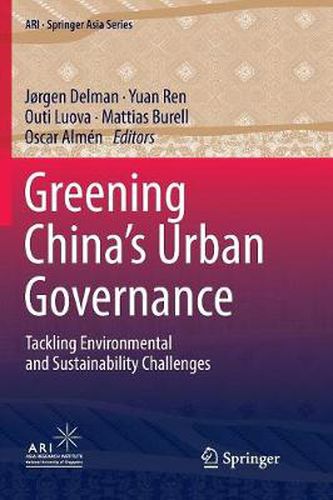Readings Newsletter
Become a Readings Member to make your shopping experience even easier.
Sign in or sign up for free!
You’re not far away from qualifying for FREE standard shipping within Australia
You’ve qualified for FREE standard shipping within Australia
The cart is loading…






This title is printed to order. This book may have been self-published. If so, we cannot guarantee the quality of the content. In the main most books will have gone through the editing process however some may not. We therefore suggest that you be aware of this before ordering this book. If in doubt check either the author or publisher’s details as we are unable to accept any returns unless they are faulty. Please contact us if you have any questions.
This volume examines how urban stakeholders in China - particularly city governments and social actors - tackle China’s urban environmental crisis. The volume’s case studies speak to important interdisciplinary themes such as new tools and instruments of urban green governance, climate change and urban carbon consumption, green justice, digital governance, public participation, social media, social movements, and popular protest. It lays out a unique theoretical framework for examining and discussing urban green governance.
The case studies are based on extensive fieldwork that examines governance failures, challenges, and innovations from across China, including the largest cities. They show that numerous policies, experiments, and reforms have been put in place in China - mostly on a pragmatic basis, but also as a result of both strategic policy design, civil participation, and protest. The book highlights how China’s urban governments bring together diverse programmatic building blocks and instruments, from China and elsewhere.
Written by experts and researchers from different disciplines at leading universities in China and the Nordic countries in Europe, this volume will be of interest to researchers and students who are interested in Chinese politics, especially urban politics, governance issues, and social movements. Both students and teachers will find the theoretical perspectives and case studies useful in their coursework.The unique green governance perspective makes this a work that is empirically and theoretically interesting for those working with urban political and environmental studies and urbanization worldwide.
$9.00 standard shipping within Australia
FREE standard shipping within Australia for orders over $100.00
Express & International shipping calculated at checkout
This title is printed to order. This book may have been self-published. If so, we cannot guarantee the quality of the content. In the main most books will have gone through the editing process however some may not. We therefore suggest that you be aware of this before ordering this book. If in doubt check either the author or publisher’s details as we are unable to accept any returns unless they are faulty. Please contact us if you have any questions.
This volume examines how urban stakeholders in China - particularly city governments and social actors - tackle China’s urban environmental crisis. The volume’s case studies speak to important interdisciplinary themes such as new tools and instruments of urban green governance, climate change and urban carbon consumption, green justice, digital governance, public participation, social media, social movements, and popular protest. It lays out a unique theoretical framework for examining and discussing urban green governance.
The case studies are based on extensive fieldwork that examines governance failures, challenges, and innovations from across China, including the largest cities. They show that numerous policies, experiments, and reforms have been put in place in China - mostly on a pragmatic basis, but also as a result of both strategic policy design, civil participation, and protest. The book highlights how China’s urban governments bring together diverse programmatic building blocks and instruments, from China and elsewhere.
Written by experts and researchers from different disciplines at leading universities in China and the Nordic countries in Europe, this volume will be of interest to researchers and students who are interested in Chinese politics, especially urban politics, governance issues, and social movements. Both students and teachers will find the theoretical perspectives and case studies useful in their coursework.The unique green governance perspective makes this a work that is empirically and theoretically interesting for those working with urban political and environmental studies and urbanization worldwide.